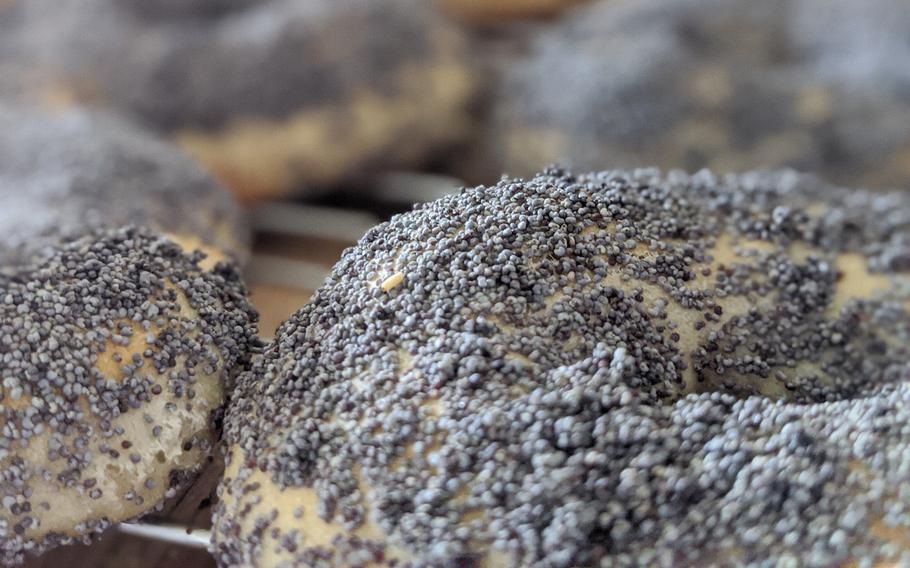
Poppy seeds may cause a positive indication for codeine or morphine in a drug screening. (Wikimedia Commons)
The Army recently revised its 142 pages of regulations on substance abuse to remind soldiers to steer clear of poppy seeds and delta-8, a mild cannabinoid, both of which may cause a positive result on drug screening tests.
The regulations, revised Oct. 4, spell out details of the Army’s program for curbing substance abuse in its ranks, including guides to “smart” drug testing, who has responsibility for carrying out testing and the protocol for carrying the test container to the toilet and delivering a sample.
For example, the person who must watch a soldier providing a urine sample must possess “unimpeachable moral character and sufficient maturity to preserve the dignity of the Soldier being tested,” the regulations state.
Delta-8 was already off limits, but the Oct. 4 revision restates its hazards and reminds troops that ingesting the drug is banned by the Army.
Delta-8 tetrahydrocannabinol is a weaker form of THC, the psychoactive ingredient in marijuana. It is naturally occurring, but most delta-8 THC found in commercial products is made in a laboratory, according to the WebMD website. Delta-8 can be found in products like gummies, capsules, creams and vape cartridges.
It is sometimes called “marijuana lite” or “diet weed” because it causes a fuzzy, less-intense high than delta-9, the stronger form of THC, according to WebMD.
“Delta-8 usage is becoming increasingly problematic among military ranks,” Michael Hicks, a drug test coordinator for the Army Substance Abuse Program at Ft. Campbell, Ky., said in an April 2022 Army news release.
The Army acknowledged but did not immediately answer a request this week for more information.
The military has a zero-tolerance policy when it comes to illegal or illicit drugs. The Army has been testing for delta-8 since July 2021, but its popularity in designer drugs like spice and increasing availability prompted its inclusion in the Oct. 4 update.
These drugs are also available in states where marijuana is legal, but they are always prohibited in the Army.
Drugs like delta-8 “have no known application other than mimicking the effects of THC in the human body,” according to the updated regulations. They are so closely related in their effects to THC that they will have the same potential for abuse as THC.
The Army warned its troops to steer clear of products containing delta-8 two years ago, pointing out that because it’s not as widely recognized as some other cannabinoids, it’s still off limits.
“Less than 1% of the population that I talk to knows what Delta-8 is, or say they have heard of it,” Byron Goode, a civilian Army Substance Abuse Program specialist based at Fort Sill, Okla., said in an October 2022 news release.
As for poppy seeds, their hazard lies not in untoward risks to physical or mental health, but in the simple fact they may cause a positive indication for codeine or morphine in a drug screening.
“Poppy seeds don’t have nearly enough opiates to intoxicate you,” the University of Florida College of Medicine website states. “But because drug tests are exquisitely sensitive, consuming certain poppy seed food products can lead to positive urine drug test results for opiates — specifically for morphine, codeine or both.”
Poppy seeds themselves don’t contain opiates, but during harvesting they can become contaminated with opiates in the milky latex of the seed pod that covers them, according to the college.
The Army in July 2021 also warned soldiers of possible false positives caused by poppy seeds. Its updated warning this month added further detail.
“Soldiers are encouraged to avoid consuming foods containing poppy seeds, as newer seeds variety may contain elevated levels of codeine,” the regulation states.
“Although drug testing laboratories have implemented additional measures to distinguish poppy seeds ingestion from codeine misuse, Soldiers should make every effort to avoid these food products,” the regulation states.